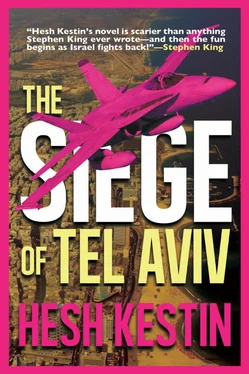“Yours?” Ido says. “What did you do, buy them?”
“I don’t have to buy them. They were taken from me without reason.”
“Yours? Oh, I see. I thought for a moment you were sober. Very good. If I live through this I’ll tell my grandchildren. It’s like those an Englishman, a Frenchman, and a Pole walk into a bar jokes. A capitalist and a gangster walk into command headquarters and the capitalist says—”
“The capitalist says he wants his tanks. Why is that funny? You’re not using them, are you?”
“Talk to the chief of staff. Pinky will be amused. He could use a good laugh.”
“You talk to Pinky,” Yigal says. “We’re reactivating the 112th.”
“That brigade is activated, Yigal. It’s just blended into something else, which you have no part of. Pinky took the map with him. When he comes back you can ask him to explain our disposition of forces, including your former tanks, all well dug-in in defensive positions.”
“Look, Ido. I don’t want this to be unfriendly. We’re taking our tanks.”
“You were relieved of command. The gangster too. You can’t just walk in and take tanks.”
Misha has had enough. It does not take much. He reaches behind him and removes the gold-plated .40-cal CZ pistol from his belt and levels it at Ido’s head. Firing at this range will leave nothing of it: torso, shoulders, neck—check. Head? None. “I changed my mind about aiming for the balls, Yigal. This piece of shit has none.”
“Oh, now I understand,” Ido says, showing no fear, a natural consequence of either hopelessness or constant hunger, perhaps both. Doubtless the jaundice does not help. “You’re going to steal the tanks.”
“You’re going to stop us?” Misha says, holding the pistol so level a ball bearing would not roll off.
“Just like that? No permission? No authority?”
“Misha, put down the gun. This is not a matter for guns. Ido, listen carefully. You’ve got a defensive perimeter as effective as a line of clothes hanging in the sun. Fewer than two hundred tanks, most of them immobile, covering a line a hundred kilometers long. On the other side there are a couple thousand enemy cans, maybe double that, maybe triple. To know exactly we’d need a satellite, and I doubt we’re in contact with those. The way we’re disposed, the enemy can break through at any point. You and I could do it with three tanks. We don’t have a defensive perimeter. We have an illusion.”
“We have the best we can do.”
Misha is still pointing the gun at Ido’s head, but now it wavers, perhaps from doubt, perhaps because it weighs almost four pounds. Even a hard guy like Misha cannot hold a weight like that steady forever. “Yigal, let me just put him out of our misery.”
“Misha, put away the gun. It’s an order. Ido is a military professional. He understands.”
“He understands this,” Misha mutters. But like a child deprived of a favored toy, Misha tips up his pistol, then places it in his lap.
“Very good. Ido, I’m taking my brigade back. But I need more. I need control of all the armor you command.”
“What is this, a coup d’état? We’re what now, Haiti? Liberia?”
“Yigal,” Misha says. “We’re running out of time. And I’m running out of patience.”
“Do you agree, Ido, that this defensive perimeter is a joke? I’m asking for your trust.”
“You’re asking for the keys to half the surviving tanks in the State of Israel.”
“I’m asking for all of them. Look, Ido, we served together over twenty years. There wasn’t a moment in that time, from officer’s training onward, that I didn’t trust you and you didn’t trust me. Comrades in arms to the end, right? Well, my friend, we have reached the end. The State of Israel barely exists, but with your help it will.”
“Yigal,” Misha says. “Let me just shoot the fucker.”
The look on Yigal’s face is no longer one of friendly persuasion. “Sergeant, shut the fuck up. When I agreed to this, it was on one condition. What was it?”
Misha makes a face. “That you command.”
“Exactly.” He turns to the general. “Ido, what is IDF doctrine when we are surrounded, outnumbered, outflanked, and down to our last ammunition and fuel?”
Ido laughs. “Attack!”
“Nu, mon general ?”
Mon General sighs, then offers a wan smile. “It’s treason, you know. Pinky can have me shot.”
“I know.”
Major General Ido Baram glances up, now to Misha, then to Yigal. “Tell me what I need to do.”
THAT NIGHT, SOMEWHERE IN the Negev desert—she is unsure precisely where, having dropped down out of the sky in an all but featureless landscape that might as well be the moon—Alex sits in a dry riverbed by the side of a paved road. She has already changed into female garb, her pilot’s uniform stuffed into the bag that had held her makeup, dress, and high heels. The road is doubtless marked at some point, but all she can tell is that it runs north-south. Her compass is functioning, as is her mind, which seems to go into overdrive under critical conditions. As a pilot, she felt confident in her competence during training flights, or when delivering a plane, but once in combat she is always ramped up, super-capable, her reflexes so quick they operate without her knowledge, eye-to-hand controls moving seamlessly without routing through the conscious brain. In the more quiet moments of her life, and this is certainly one of them, she wonders if her wandering gender identities are in some way connected to the peculiar duality of her abilities as a pilot.
For hours, a dozen lappet-faced vultures have been circling above, even now in the moonlight. These respect neither rank nor politics, gender nor nationality. As far as the vultures are concerned, Alex is just another lone animal that soon, without water, will be weak, delirious, defenseless. The morticians of the animal world, they normally wait respectfully for their meals to die. But unconscious living flesh is the same as dead. Their eyesight is as sharp as that of the local Bedouin, whose appetite for prey is no less refined.
These Negev tribesmen are capable of spotting a lit cigarette a mile off. Alex knows enough about the clans hereabout to know how much danger she is in. In fact, though Israel Air Force doctrine focuses on saving aircraft as well as pilot, in case of an emergency over the Negev a forced landing is never advised. Let the plane crash elsewhere, miles from where your parachute falls. Landing the plane successfully means the pilot will be found in a matter of minutes, because there is no way to distance oneself sufficiently from the aircraft before it will be spotted by enemy reconnaissance from above, enemy ground forces nearby, or by camel-mounted Bedouin tribesman eager for bounty. In this three-dimensional game of chess, it is better to remain a live pawn than a trapped queen.
But this queen does not feel trapped.
Alex is already on the offensive, planning her next moves. First priority: wheels.
Just as she finishes applying her lipstick, a kind of crimson this evening (she prefers earth tones for daytime), a convoy of Egyptian infantry, some twenty trucks, comes into view. There is sufficient moonlight for her to identify the unit number painted on the sides, but of course no one to report it to, and no radio to report it with. Anyway, trucks full of infantry are not what she needs. Within a few minutes, there it is: a ’70s-era Cadillac sedan painted olive green and flying the red, white, and black standard of the Egyptian high command.
She scrambles out of the wadi, no easy matter in four-inch heels, and flags the Cadillac down, showing a bit of leg in the process. As though magnetized, the staff car pulls to a halt, then backs up.
Читать дальше












